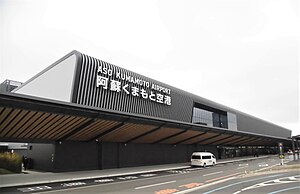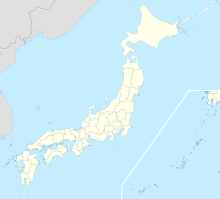Kumamoto Airport
Kumamoto Airport 熊本空港 Kumamoto Kūkō | |||||||||||
|---|---|---|---|---|---|---|---|---|---|---|---|
 | |||||||||||
| Summary | |||||||||||
| Airport type | Public | ||||||||||
| Serves | Kumamoto | ||||||||||
| Location | Mashiki, Kumamoto | ||||||||||
| Elevation AMSL | 632 ft / 193 m | ||||||||||
| Coordinates | 32°50′14″N 130°51′19″E / 32.83722°N 130.85528°E | ||||||||||
| Website | https://www.kumamoto-airport.co.jp/en/ | ||||||||||
| Map | |||||||||||
 | |||||||||||
| Runways | |||||||||||
| |||||||||||
| Statistics (2015) | |||||||||||
| |||||||||||
Source: Japanese Ministry of Land, Infrastructure, Transport and Tourism[1] | |||||||||||
Kumamoto Airport (熊本空港, Kumamoto Kūkō) (IATA: KMJ, ICAO: RJFT), also known as Aso Kumamoto Airport (阿蘇くまもと空港, Aso Kumamoto Kūkō), is an airport in Mashiki, Kumamoto, Japan.
History
[edit]The first Kumamoto Airport opened in 1960 on the site of a former Imperial Japanese Army air base and had a 1,200 m runway. It was replaced by the current Kumamoto Airport in 1971. The new airport's 2,500 m runway was extended to 3,000 m in 1980.[2]
Kumamoto was one of three nationally owned airports to turn a profit in fiscal year 2011 (along with New Chitose Airport and Komatsu Airport).[3] In 2013, the government passed legislation aimed at eventually allowing the sale of an operating concession at the airport.[4]
China Airlines charter service to Kaohsiung was announced in 2014 in order to cater to packaged tours from Taiwan.[5]
In March 2018, the Ministry of Land, Infrastructure, Transport and Tourism decided to outsource the operation to a private company from April 2020 in order to accelerate the recovery from the Kumamoto earthquakes and to promote utilization and improve services by making use of private sector know-how.[citation needed] The operator is Kumamoto International Airport Co., Ltd., which is funded by a consortium of 11 companies led by Mitsui Fudosan.[citation needed]
Following the 2016 Kumamoto earthquakes, which severely damaged the airport, Kumamoto International Airport Co., Ltd. began developing a new terminal building which was planned to withstand strong earthquakes. It was also made to integrates both domestic and international flights. The new terminal building officially opened on March 23, 2023.[6]
Airlines and destinations
[edit]Statistics
[edit]Graphs are unavailable due to technical issues. There is more info on Phabricator and on MediaWiki.org. |
References
[edit]- ^ "Kumamoto Airport" (PDF). Japanese Ministry of Land, Infrastructure, Transport and Tourism. Archived from the original (PDF) on 21 October 2016. Retrieved 7 January 2017.
- ^ "会社概要". Kumamoto Airport Building Co., Ltd. Archived from the original on 28 May 2014. Retrieved 4 April 2014.
- ^ "国管理の空港、9割が赤字 11年度". Nihon Keizai Shimbun. 10 September 2013. Retrieved 4 April 2014.
- ^ "国の28空港、民間委託可能に 新法案を閣議決定". Nihon Keizai Shimbun. 5 April 2013. Retrieved 4 April 2014.
- ^ "熊本―台湾・高雄、定期チャーターで合意". Nihon Keizai Shimbun. 3 April 2014. Retrieved 4 April 2014.
- ^ "3月23日 新旅客ターミナルビルオープン!" ["March 23, New passenger terminal will open!"]. 阿蘇くまもと空港. 20 March 2023. Retrieved 7 November 2023.
- ^ "Asiana Airlines Expands Kyushu Service in NW24". Aeroroutes. Retrieved 2 September 2024.
- ^ "China Airlines Schedules Taipei – Kumamoto Service in 2H23". Aeroroutes. Retrieved 16 June 2023.
- ^ "EastarJet Schedules New Busan – Japan Routes in late-Dec 2024". Aeroroutes. Retrieved 20 September 2024.
- ^ "Hong Kong Airlines Resumes Kumamoto Service From Dec 2023". Aeroroutes. Retrieved 29 September 2023.
- ^ Liu, Jim (16 October 2024). "Korean Air Resumes Kumamoto Service in NW24". AeroRoutes.
- ^ "Starlux Airlines Plans Taipei – Kumamoto Launch in Sep 2023". Aeroroutes. Retrieved 29 May 2023.
External links
[edit]![]() Media related to Kumamoto Airport at Wikimedia Commons
Media related to Kumamoto Airport at Wikimedia Commons
- Kumamoto Airport (in English)
- Kumamoto Airport (in Japanese)


